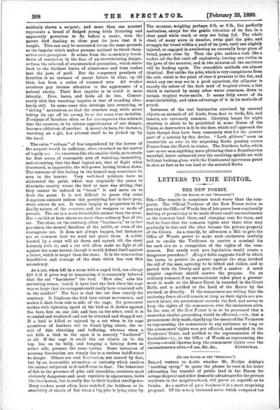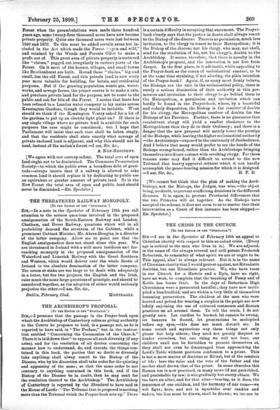[To THE EDITOR Or THE " SPECTATOR."] SIR,-1 venture to
doubt whether Mr. Evelyn Ashley's "soothing syrup," to quote the phrase he uses in his letter advocating the transfer of public land in the Forest for sewage disposal and other domestic advantages for the private residents in the neighbourhood, will prove as soporific as he thinks. As a matter of pale business it is a most surprising proposal. Of the ninety thousand acres which composed the
Forest when the perambulations were made three hundred years ago, some twenty-four thousand acres have now become private property. Quite one thousand acres were lost between 1840 and 1870. To this must be added certain areas not in- cluded in the Act syhich made the Forest " open and wild," and retained by the Woods and Forests Office to make a profit out of. This great area of private property is scattered like "claims," pegged out irregularly in various parts of the Forest. On it most of the houses, villages, and small towns like Brockenhurst are built. Round these "claims," big and small, lies the old Forest, and this private land is now every year more valuable for building, for hotels, and residential purposes. But if the growing population wants gas, water- works, and sewage farms, the proper course is to make a rate, and purchase private land for the purpose, not to come to the public and ask for bits of the Forest. I notice that leave has been refused to a London water company to lay mains across Kensington Gardens, though they would be invisible. What should we think if the Kensington Vestry asked for a bit of the gardens to put up an electric light plant on ? If there is any single village where no private land is available for such purposes the case might be considered ; but I hope that Parliament will insist that each case shall be taken singly, and that the residents shall state exactly what acreage of private enclosed land is adjacent, and why this should not be used, instead of the nation's forest. —I am, Sir, &c.,
A NON-RESIDENT.
We agree with our correspondent. The total area of open land ought not to be diminished. The Commons Preservation Society—to which the public owes a boundless debt of grati- tude—always insists that if a railway is allowed to take common land it should replace it by dedicating to public use an equivalent or greater amount of private land. So in the New Forest the total area of open and public land should never be diminished.—ED. Spectator.]







































 Previous page
Previous page